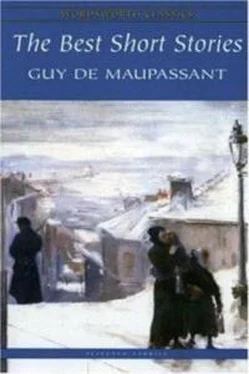"Other things occupied my attention, and it was about a month before I thought much about this little cemetery friend. However, I did not forget her. The recollection of her haunted me like a mystery, like a psychological problem, one of those inexplicable questions whose solution baffles us.
"I do not know why, but one day I thought I might possibly meet her in the Montmartre Cemetery, and I went there.
"I walked about a long time without meeting any but the ordinary visitors to this spot, those who have not yet broken off all relations with their dead. The grave of the captain killed at Tonquin had no mourner on its marble slab, no flowers, no wreath.
"But as I wandered in another direction of this great city of the dead I perceived suddenly, at the end of a narrow avenue of crosses, a couple in deep mourning walking toward me, a man and a woman. Oh, horrors! As they approached I recognized her. It was she!
"She saw me, blushed, and as I brushed past her she gave me a little signal, a tiny little signal with her eye, which meant: 'Do not recognize me!' and also seemed to say, 'Come back to see me again, my dear!'
"The man was a gentleman, distingue, chic, an officer of the Legion of Honor, about fifty years old. He was supporting her as I had supported her myself when we were leaving the cemetery.
"I went my way, filled with amazement, asking myself what this all meant, to what race of beings belonged this huntress of the tombs? Was she just a common girl, one who went to seek among the tombs for men who were in sorrow, haunted by the recollection of some woman, a wife or a sweetheart, and still troubled by the memory of vanished caresses? Was she unique? Are there many such? Is it a profession? Do they parade the cemetery as they parade the street? Or else was she only impressed with the admirable, profoundly philosophical idea of exploiting love recollections, which are revived in these funereal places?
"And I would have liked to know whose widow she was on that special day."
What a strange idea it was for me to choose Mademoiselle Pearl for queen that evening!
Every year I celebrate Twelfth Night with my old friend Chantal. My father, who was his most intimate friend, used to take me round there when I was a child. I continued the custom, and I doubtless shall continue it as long as I live and as long as there is a Chantal in this world.
The Chantals lead a peculiar existence; they live in Paris as though they were in Grasse, Evetot, or Pont–a–Mousson.
They have a house with a little garden near the observatory. They live there as though they were in the country. Of Paris, the real Paris, they know nothing at all, they suspect nothing; they are so far, so far away! However, from time to time, they take a trip into it. Mademoiselle Chantal goes to lay in her provisions, as it is called in the family. This is how they go to purchase their provisions:
Mademoiselle Pearl, who has the keys to the kitchen closet (for the linen closets are administered by the mistress herself), Mademoiselle Pearl gives warning that the supply of sugar is low, that the preserves are giving out, that there is not much left in the bottom of the coffee bag. Thus warned against famine, Mademoiselle Chantal passes everything in review, taking notes on a pad. Then she puts down a lot of figures and goes through lengthy calculations and long discussions with Mademoiselle Pearl. At last they manage to agree, and they decide upon the quantity of each thing of which they will lay in a three months' provision; sugar, rice, prunes, coffee, preserves, cans of peas, beans, lobster, salt or smoked fish, etc., etc. After which the day for the purchasing is determined on and they go in a cab with a railing round the top and drive to a large grocery store on the other side of the river in the new sections of the town.
Madame Chantal and Mademoiselle Pearl make this trip together, mysteriously, and only return at dinner time, tired out, although still excited, and shaken up by the cab, the roof of which is covered with bundles and bags, like an express wagon.
For the Chantals all that part of Paris situated on the other side of the Seine constitutes the new quarter, a section inhabited by a strange, noisy population, which cares little for honor, spends its days in dissipation, its nights in revelry, and which throws money out of the windows. From time to time, however, the young girls are taken to the Opera–Comique or the Theatre Francais, when the play is recommended by the paper which is read by M. Chantal.
At present the young ladies are respectively nineteen and seventeen. They are two pretty girls, tall and fresh, very well brought up, in fact, too well brought up, so much so that they pass by unperceived like two pretty dolls. Never would the idea come to me to pay the slightest attention or to pay court to one of the young Chantal ladies; they are so immaculate that one hardly dares speak to them; one almost feels indecent when bowing to them.
As for the father, he is a charming man, well educated, frank, cordial, but he likes calm and quiet above all else, and has thus contributed greatly to the mummifying of his family in order to live as he pleased in stagnant quiescence. He reads a lot, loves to talk and is readily affected. Lack of contact and of elbowing with the world has made his moral skin very tender and sensitive. The slightest thing moves him, excites him, and makes him suffer.
The Chantals have limited connections carefully chosen in the neighborhood. They also exchange two or three yearly visits with relatives who live in the distance.
As for me, I take dinner with them on the fifteenth of August and on Twelfth Night. That is as much one of my duties as Easter communion is for a Catholic.
On the fifteenth of August a few friends are invited, but on Twelfth Night I am the only stranger.
Well, this year, as every former year, I went to the Chantals' for my Epiphany dinner.
According to my usual custom, I kissed M. Chantal, Madame Chantal and Mademoiselle Pearl, and I made a deep bow to the Misses Louise and Pauline. I was questioned about a thousand and one things, about what had happened on the boulevards, about politics, about how matters stood in Tong–King, and about our representatives in Parliament. Madame Chantal, a fat lady, whose ideas always gave me the impression of being carved out square like building stones, was accustomed to exclaiming at the end of every political discussion: "All that is seed which does not promise much for the future!" Why have I always imagined that Madame Chantal's ideas are square? I don't know; but everything that she says takes that shape in my head: a big square, with four symmetrical angles. There are other people whose ideas always strike me as being round and rolling like a hoop. As soon as they begin a sentence on any subject it rolls on and on, coming out in ten, twenty, fifty round ideas, large and small, which I see rolling along, one behind the other, to the end of the horizon. Other people have pointed ideas—but enough of this.
We sat down as usual and finished our dinner without anything out of the ordinary being said. At dessert the Twelfth Night cake was brought on. Now, M. Chantal had been king every year. I don't know whether this was the result of continued chance or a family convention, but he unfailingly found the bean in his piece of cake, and he would proclaim Madame Chantal to be queen. Therefore, I was greatly surprised to find something very hard, which almost made me break a tooth, in a mouthful of cake. Gently I took this thing from my mouth and I saw that it was a little porcelain doll, no bigger than a bean. Surprise caused me to exclaim:
"Ah!" All looked at me, and Chantal clapped his hands and cried: "It's Gaston! It's Gaston! Long live the king! Long live the king!"
Читать дальше












